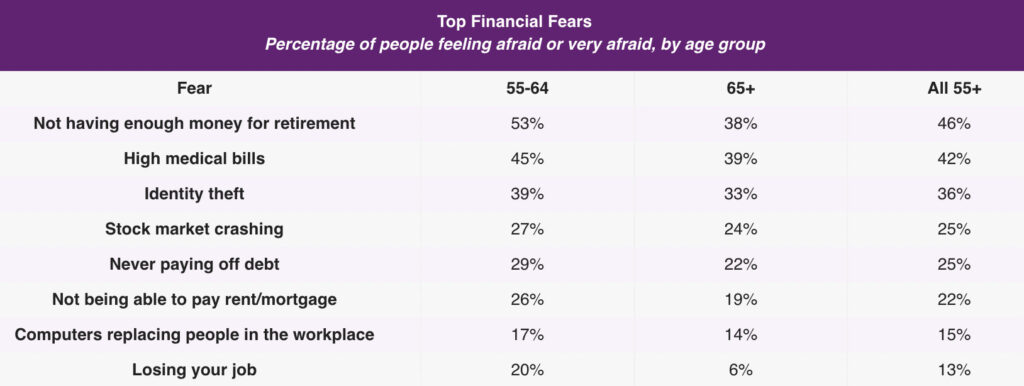Top 10 financial fears of older adults in 2021
About one in five Baby Boomers are retired, and the pace at which they’re leaving the workforce increased in 2020, potentially due to the COVID-19 pandemic. But are they ready for retirement?
A new survey on the fears that keep Americans up at night has found that older adults are the least likely of all generations to feel more anxiety today than before the pandemic began. But that’s not to say they’re without fear; in fact, more than half of those between 55 and 64 are worried they don’t have enough money saved for their golden years.

SeniorLiving.org surveyed more than 2,000 U.S. adults, asking them to rate their level of concern over more than three dozen topics, ranging from spiders to terrorism, to see what Americans fear most.
While older adults were less likely than younger people to say they were more anxious today, many of their major fears are related to finances, including not having saved enough for retirement and facing high medical bills as they age.
Check out the full analysis here, and explore some key overall results:
Key Findings
- Behind the death or illness of loved ones and societal issues, not having enough retirement savings was the No. 1 fear for older adults.
- About 46 percent of older adults are worried they won’t have enough money saved up for retirement, while those between 55 and 64 were even more likely to have this fear than those already 65 and up.Nearly 40 percent of people over 65, many of whom are on Medicare, are fearful of having high medical bills.
- Please let us know if you have any questions about the survey or would like more information.
More Fearful Today?
Tens of millions of Americans lost their jobs in 2020 because of the pandemic.
At least 21 million and as many as 103 million seniors were infected with COVID-19. And nearly 400,000 older people died from the virus, according to data from the federal Centers for Disease Control and Prevention.
So, it’s understandable for people to be more anxious than they were before the pandemic. Research found that about 44 percent of people said they were more anxious today than a year ago. Notably, though, people over 65 were the least likely to be more anxious (31 percent), followed by those between 55 and 64 (38 percent).
But what were their 10 biggest worries?

Seniors’ Biggest Worries
Older adults’ biggest fear is their loved ones becoming seriously ill, and this was a common thread for all age groups, with at least 56 percent saying serious illness of a loved one was a major fear. The death of a loved one was also a major fear for all age groups, while sociopolitical issues like mass shootings, terrorism, and widespread civil unrest were generally more common for older adults than younger age groups.
After the death or illness of loved ones and political fears, not having sufficient retirement savings was the top fear for older adults. High medical bills ranked 11th and identity theft was 15th among the more than three dozen fears we asked about.
Older women were especially concerned about not having enough money for retirement. Forty-one percent of older men said this was a major fear of theirs compared to 52 percent of older women. There are several potential reasons for such a wide disparity.

For one, women tend to live longer than men, so their retirement periods are generally lengthier. In fact, the average American woman will be retired for nearly 20 years, while the average American man’s retirement period is closer to 16 years. Women also tend to earn less than men; the median annual wage for a male worker in the U.S. is about $59,000, while it’s about $48,000 for women.
That means not only does the average woman earn less, leaving less money to put into retirement in the first place, but she also has to make her retirement savings last longer. Making matters worse was the workforce crisis brought on by COVID-19, which disproportionately affected women, who were more likely to exit the workforce. An Edward Jones survey of future retirees found that only 41 percent of women who were planning to retire were able to continue putting money away each month, compared to 58 percent of men.7
Financial Fears
Not having enough money saved for retirement was the top financial concern of the older adults in our survey, but it wasn’t the only one. In addition to the specter of high medical bills, which ranked just outside the top 10 fears for seniors, the age group has strong fears of identity theft, stock market fluctuations, not paying off debt, and other fiscal concerns.
All financial fears were more common for those pre-retirement than those over 65, but there were some notable differences. For example, 53 percent of people between 55 and 64 fear not having enough money for retirement compared to just 38 percent for those 65 and up, indicating that those in the younger bracket are feeling more pressure to ensure they’ve sufficiently secured their retirement. The other major gulf between the two groups was in the specter of losing their job; only six percent of those 65 and up fear this, compared to 20 percent of those between 55 and 64.
For the full study and some resources, go here.






